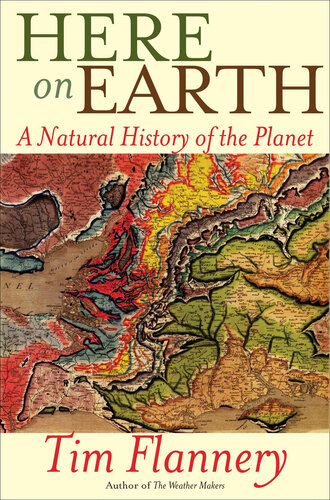
Here on Earth
A Natural History of the Planet
کتاب های مرتبط
- اطلاعات
- نقد و بررسی
- دیدگاه کاربران
نقد و بررسی

Starred review from January 15, 2011
Flannery (Environmental Sustainability/Macquarie Univ.; Chasing Kangaroos, 2008, etc.) scrutinizes humankind's relationship to Earth and manages to find optimism at this critical, crossroads moment.
What is the nature of Earth, asks the author, and how flexible and resilient is it? What course will civilization take relative to ecological systems? Flannery suggests that two tendencies have been spawned by evolutionary theory: Medean, which hypothesizes that our selfish species will self-destruct by exploiting resources to the point of ecosystem collapse; and Gaian, which states that Earth is a self-regulating, living organism capable of a comfortable steady state, and that humans can learn from their mistakes. Flannery is one of those rare science explicators who combines both graceful style with utter cogency. When he throws his hat in the ring with the Gaians, which seems like a long shot in the face of all the ruinous environmental behavior exhibited by humans—and which Flannery explains in detail—readers will happily join him there, for he has plenty of evidence of the natural world, humans included, working in cooperative coevolution: interactions that can "lead to the development of ever more intricate relationships, which can, in some circumstances, create a sum of biological productivity that is greater than its parts." Flannery smoothly moves through time and space, rooting out countless instances of cooperative, sustainable behavior—what could be called the ecstasy of the commons—tempered by an ingrained biophilia and a more capacious notion of self-interest.
A lyrical, informed investigation into the human as ecological agent, and a provocation to act responsibly.
(COPYRIGHT (2011) KIRKUS REVIEWS/NIELSEN BUSINESS MEDIA, INC. ALL RIGHTS RESERVED.)

November 1, 2010
Outstanding paleontologist/environmentalist Flannery (Now or Never)--Australian of the Year in 2007 (I love that)--here elucidates two ways of viewing Earth's fate. The Medea hypothesis argues that, left untrammeled, species will exploit their ecosystems to the point of collapse. But James Lovelock's Gaia hypothesis counters that Earth knows how to adjust. Flannery favors the latter view, urging us to bond better with self-regulating nature. Good green reading.
Copyright 2010 Library Journal, LLC Used with permission.

March 15, 2011
Deeply concerned by humanitys impact on the earths environment, Flannery indicted climate change in The Weather Makers (2006). Widening his scope in this work, he expands on the proposition that humans inherently exhaust their resources, triggering all manner of ecological and societal trauma. To evaluate the idea, he ranges over the entirety of human existence, remarking within each subtopic he raisesfor example, the Aborigines relation to Australian ecosystemsthe ramifications of human use of available natural resources. From his woeful tales, readers might conclude that Flannery is pessimistic about civilizations survival, and lengthy indeed is his catalog of environmental destruction, historic and contemporary. But another idea, which he evidently borrowed from entomologist E. O. Wilsons The Superorganism (2008), makes him more optimistic. Comparing human behavior with that of ant colonies, Flannery suggests that cooperative action can potentially arise in the cause of environmental sustainability. Wrapping this hope in discussions of evolution and James Lovelocks Gaia theories, Flannery appeals to environmentalists thinking on planet-wide scales about humanitys relation to nature.(Reprinted with permission of Booklist, copyright 2011, American Library Association.)

























دیدگاه کاربران